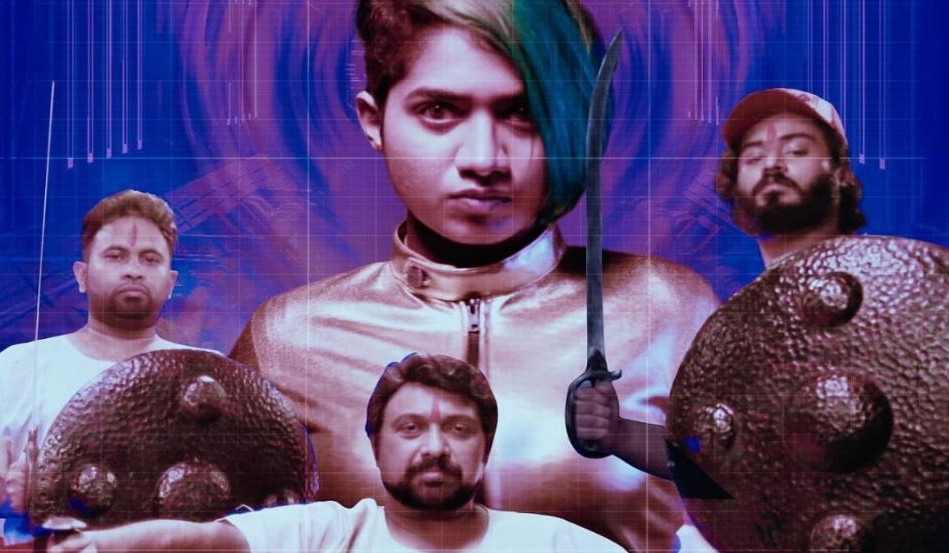Gaganachari: A Dystopian Mockumentary
Released in June 2024, Gaganachari is a Malayalam-language film that ventures into the realm of science fiction, a genre seldom explored in Indian cinema. Directed by Arun Chandu, this dystopian mockumentary seamlessly blends satire, humor, and socio-political commentary, offering viewers a uniquely engaging experience. While sci-fi films typically lean on high-budget visual spectacle, Gaganachari relies more on its sharp writing, dark humor, and cultural references to build its world. This makes it a refreshing departure from traditional science fiction, especially within the Indian film industry.
Set against the backdrop of a post-apocalyptic Kerala, Gaganachari follows the lives of three individuals, Victor (Ganesh Kumar), Allan (Gokul Suresh), and Vaibhav (Aju Varghese), as they navigate existence in a world altered by a hostile alien invasion. The narrative unfolds through a documentary-style interview program, providing insights into Kerala's transformation before and after the extraterrestrial incursion. Set in the 2040s/50s, the mockumentary format allows the film to blur the lines between reality and fiction, giving audiences a satirical look at how society functions under extreme circumstances.
As the characters share their experiences, the film delves into the complexities of human relationships, societal norms, and the blurred lines between humanity and alien influence. The invasion is less about war and destruction and more about subtle domination, making for an eerie yet comedic premise. The film cleverly plays with tropes from both dystopian fiction and real-world issues, making it feel grounded despite its sci-fi setting.
Ganesh Kumar delivers a standout performance as Victor, capturing the nuances of a man grappling with the absurdities of a dystopian reality. His comedic timing and on-screen presence add depth to the character, making him both relatable and memorable. Gokul Suresh, known for his versatility, brings Allan to life with a blend of humor and subtlety, while Aju Varghese's portrayal of Vibhav adds gravitas to the trio's dynamic. Anarkali Marikar also deserves mention for her role, contributing significantly to the film's narrative.
The chemistry among the leads is one of the film’s strongest assets. Their interactions feel natural, and their humor doesn’t feel forced. Even in moments of tension, the characters maintain a level of sarcasm and wit that prevents the film from becoming overly dramatic. This makes Gaganachari more than just a sci-fi film; it becomes a character-driven story that resonates with audiences beyond the genre’s usual fanbase.
Arun Chandu's direction is commendable, skillfully balancing the film's satirical elements with its science fiction premise. The mockumentary format is executed with precision, allowing for a narrative that is both engaging and thought-provoking. The documentary-style storytelling makes the events feel eerily real, drawing audiences into its world.
However, one area where Gaganachari falls short is in its visual execution. For a sci-fi movie, the expectation of high-quality, immersive visuals remains unmet, reflecting that the film was made on a limited budget. The world-building, while conceptually strong, lacks the grand visual scale that audiences often associate with the genre. The CGI is minimal, and the practical effects, while effective in some scenes, do not elevate the film to a visually stunning spectacle.
That said, what it lacks in visual appeal, it makes up for in humor and nuance. The film embraces its budgetary constraints by leaning into its satirical roots rather than trying to compete with big-budget sci-fi productions. Instead of high-end CGI, Gaganachari offers intelligent writing, strong performances, and a unique approach to storytelling.
Gaganachari serves as a satirical critique of societal structures, cultural norms, and the human condition. The film cleverly uses the alien invasion as a metaphor to explore themes of caste, relationships, and the inherent absurdities within societal hierarchies. The humor is quirky and laden with references to Malayalam pop culture, making it particularly resonant for audiences familiar with the region's cinematic history. However, even viewers less versed in these references can appreciate the film's universal themes and insightful commentary.
The film raises several important questions: How do humans react to the unknown? How much control are we willing to give up in exchange for a sense of security? And how much of our identity is shaped by those who rule over us? These questions are woven seamlessly into the narrative, making Gaganachari a film that lingers in the mind long after the credits roll.
Gaganachari has been well-received by both critics and audiences. Online forums and user reviews praise the film's humor, performances, and innovative approach to storytelling. While some critics note that the film's use of extraterrestrial elements as a plot device may feel predictable to ardent sci-fi enthusiasts, the consensus remains that the execution and cultural specificity set Gaganachari apart in the genre.
Malayalam cinema has often been praised for its willingness to experiment, and Gaganachari continues this tradition. It stands alongside other unconventional films that prioritize storytelling over commercial appeal. The response from younger audiences, in particular, has been overwhelmingly positive, with many praising the film for its intelligent humor and satirical edge.
While Gaganachari is not the first Indian sci-fi film, it is among the few that effectively blend the genre with comedy and social commentary. It draws comparisons to international films like ‘District 9’ and ‘The World's End’, where science fiction is used as a lens to critique real-world issues. However, it remains distinctly Indian in its execution, making it a rare gem in the country's film landscape.
The film also signals a shift in audience expectations. As Indian cinema evolves, there is a growing demand for stories that break the mold of conventional storytelling. Gaganachari is proof that a film doesn't need a massive budget to leave a lasting impact; it just needs a strong vision and the right execution.

Gaganachari stands as a testament to the evolving landscape of Indian cinema, where filmmakers are increasingly willing to experiment with genres and narrative structures. By infusing science fiction with local cultural nuances and satirical humor, Arun Chandu has crafted a film that is both entertaining and thought-provoking. Though it lacks the visual grandeur associated with mainstream sci-fi, its wit and depth make it a rewarding watch.
The film’s strengths lie in its performances, writing, and humor, making it an enjoyable experience for audiences who appreciate satire and social commentary. It’s a reminder that science fiction doesn’t always have to be about futuristic technology or space battles; sometimes, the most compelling stories come from looking at society through a different lens.
Gaganachari is a commendable addition to Malayalam cinema, successfully marrying the speculative allure of science fiction with the grounded, often humorous realities of societal observation. If you’re looking for a film that challenges conventions while keeping you entertained, this is worth watching.
Rating: ★★★★☆ (4/5)
| Directed by | Arun Chandu |
| Written by | Siva Sai Arun Chandu |
| Produced by | Vinayaka Ajith |
| Starring | |
| Cinematography | Surjith S. Pai |
| Edited by | Aravind Manmadhan |
| Music by | Sankar Sharma |
Production companies | Ajith Vinayaka Films Krishand Films |
| Release date | 21 June 2024 |
| Running time | 115 minutes |
| Country | India |
| Language | Malayalam |





